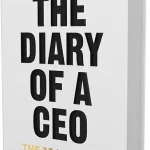
Rich Dad Poor Dad – Robert Kiyosaki




Main Idea: “The Age of AI: And Our Human Future” by Henry Kissinger, alongside co-authors Eric Schmidt and Daniel Huttenlocher, delves into the transformative potential of artificial intelligence (AI) on global affairs, human cognition, and the very fabric of society. It argues that AI presents both unprecedented opportunities and challenges, requiring a reevaluation of our ethical frameworks, governance structures, and the human-machine relationship.
Key Points:
Review:
Recommendation: